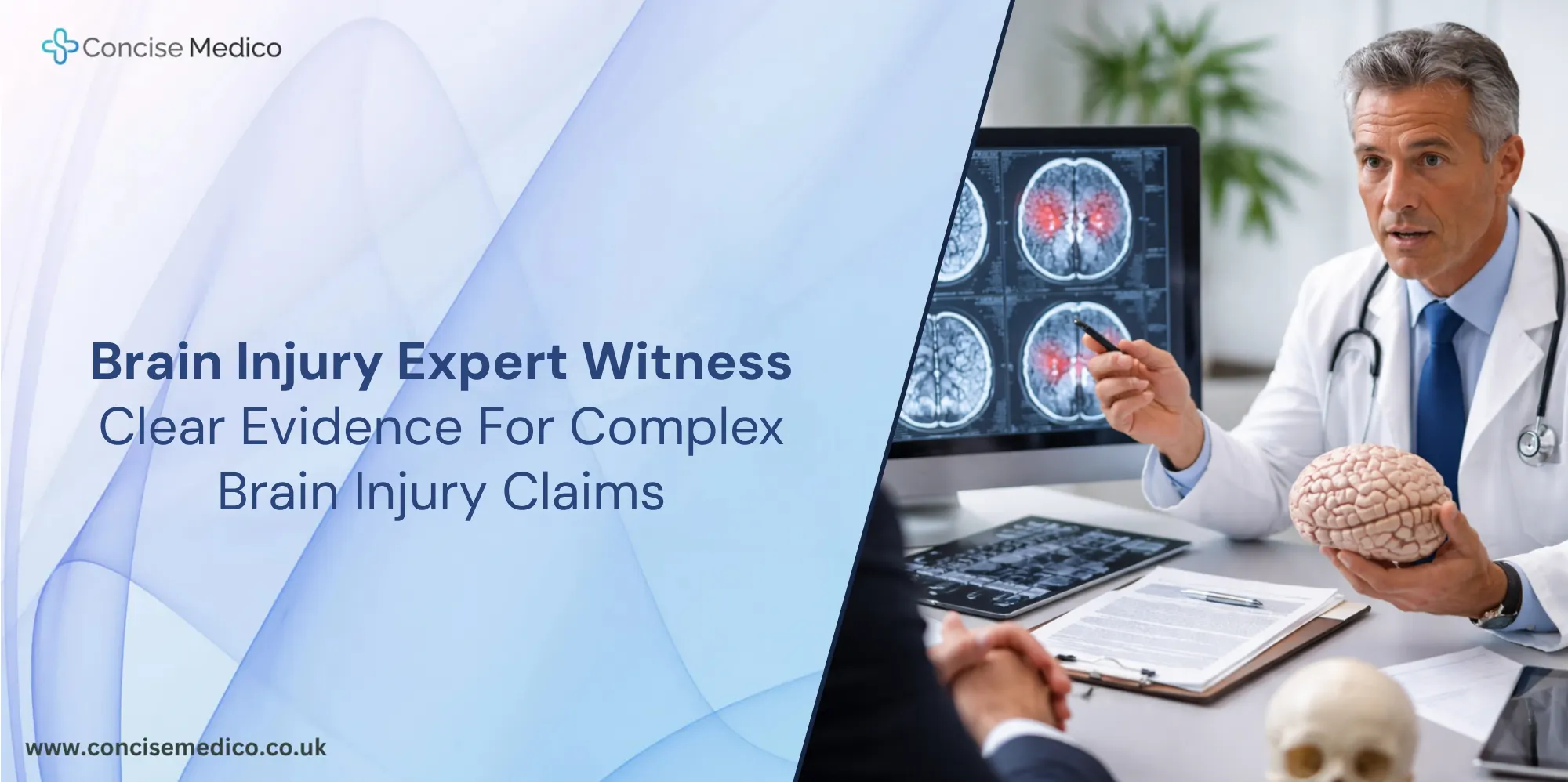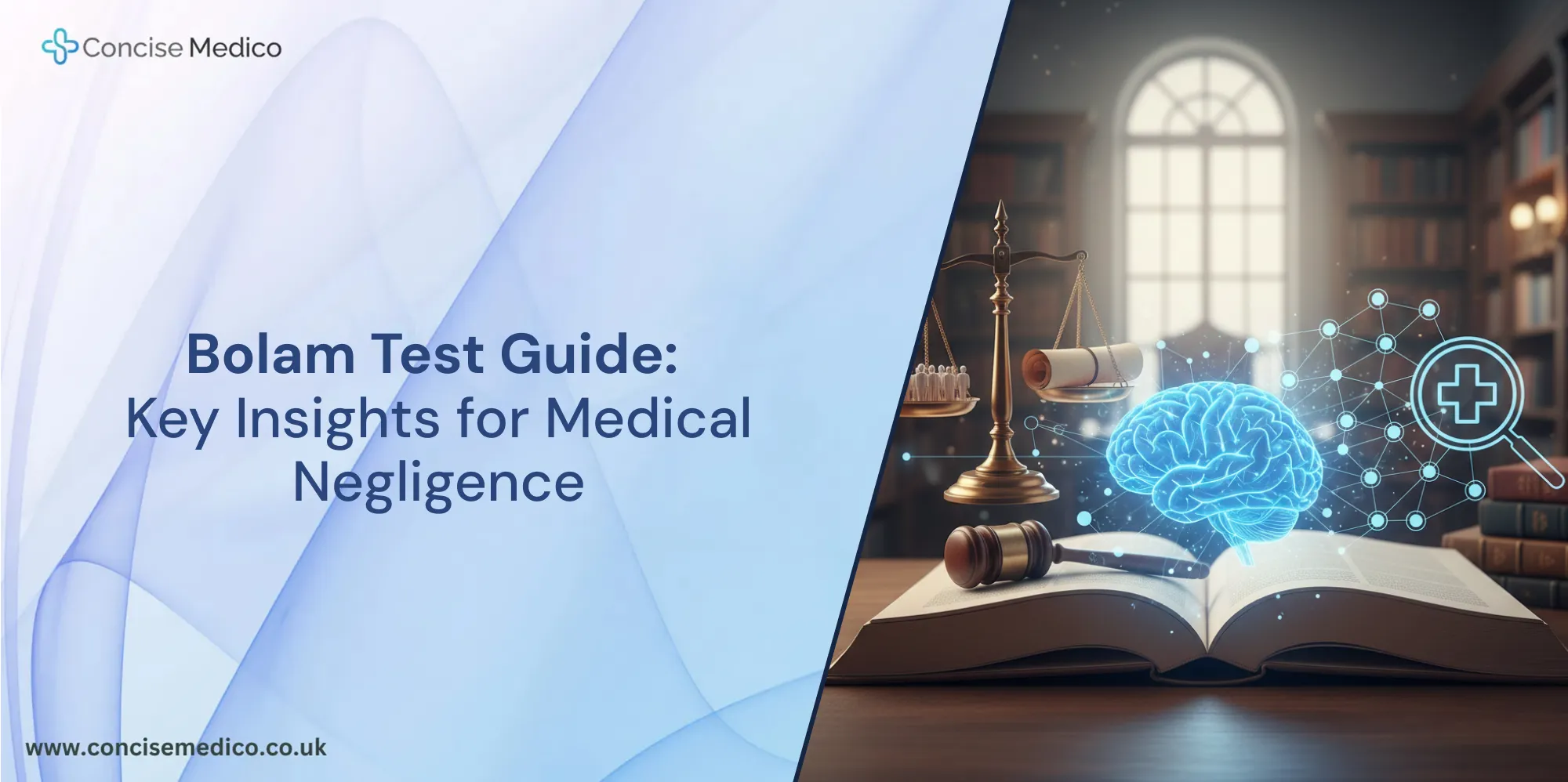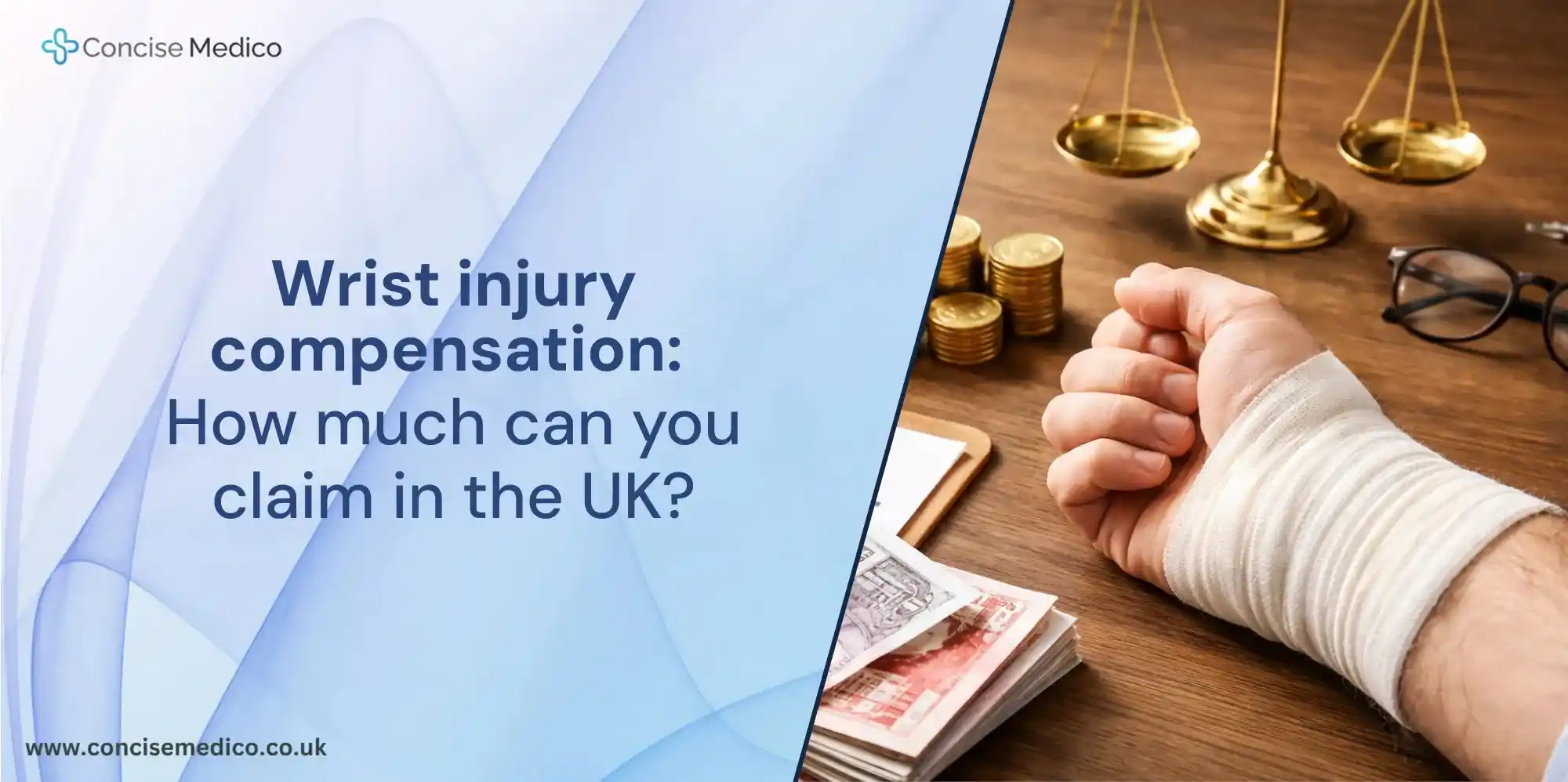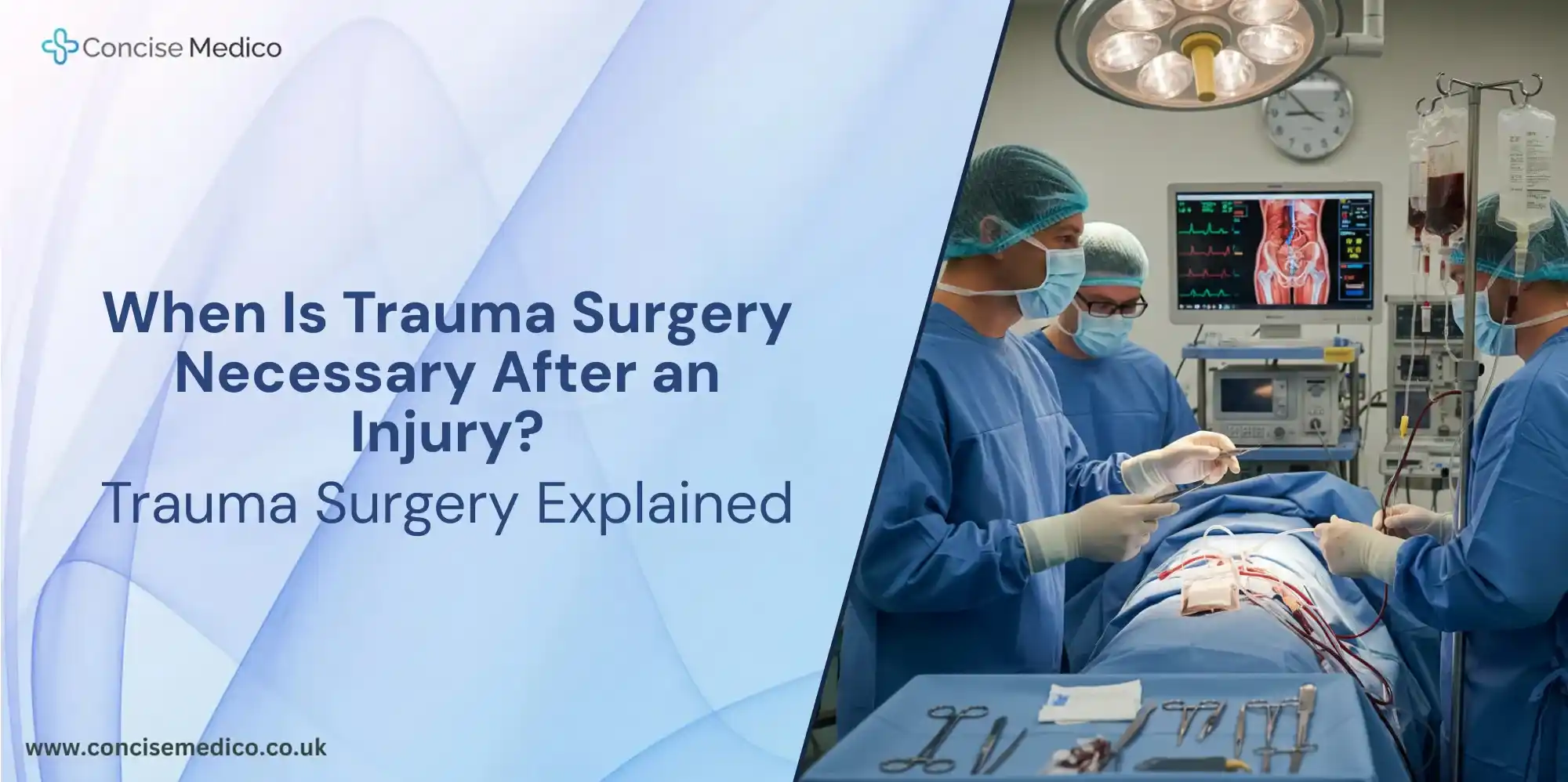Physical healing is not always the end of personal injury. Many people also experience emotional distress, which can last considerably longer. Your emotional issues may also lead to Post-Traumatic Stress Disorder (PTSD). This condition is a result of upsetting or stressful events. It can affect multiple aspects of your life, such as sleep, work, relationships, etc.. A personal injury PTSD compensation aims to help you through this situation. It aims to offset the emotional distress you suffered. Here are the details about the personal injury claim for PTSD.
Can you get PTSD from an injury?
PTSD is a common result of injuries. The injuries here imply that you suffered harm because of someone else’s fault. This harm can lead to PTSD.
PTSD occurs when the injury-causing event threatens any harm or violence. As a result, you end up having intense, disturbing thoughts about the event.
You can get a formal diagnosis and file for personal injury PTSD compensation. Here are the symptoms that should prompt your visit to a doctor.
Symptoms of PTSD from personal injury:
Symptoms of PTSD can vary in every person. Here are some of them that you may experience after an incident:
- Avoidance of the site of the accident
- Negative Mood Swings
- Flashbacks of the event
- Dizziness
- Headaches
- Nausea
- Nightmares and other sleep disturbances
- Issues in focusing
- Depression
- Anxiety
- Startle response
Get useful insights about Anxiety disorder.
Causes of personal injury PTSD
PTSD personal injury settlements can be claimed in a lot of cases. All of these cases should fulfil the conditions for a personal injury claim for PTSD. Here are a few examples:
Learn more about personal injury.
1. Road Traffic Accidents (RTAs)
Around the world, RTAs are considered to be a major cause of PTSD. According to studies, 25% of people suffer from PTSD after an RTA. Majorly, the situation becoming unpredictable is what leads you to PTSD. The following are scenarios that commonly lead to PTSD:
High-impact collisions
Victims are traumatised in these accidents because the crashes are often high-speed.
Fatal accidents
If you witness someone’s death or severe injuries in an accident, you are likely to develop PTSD.
Bicycle and pedestrian collisions
If any bicycle user or pedestrian is hit by a vehicle, they can get PTSD since the event is so violent. Personal injury PTSD compensation ensures that you are compensated for this mental anguish.
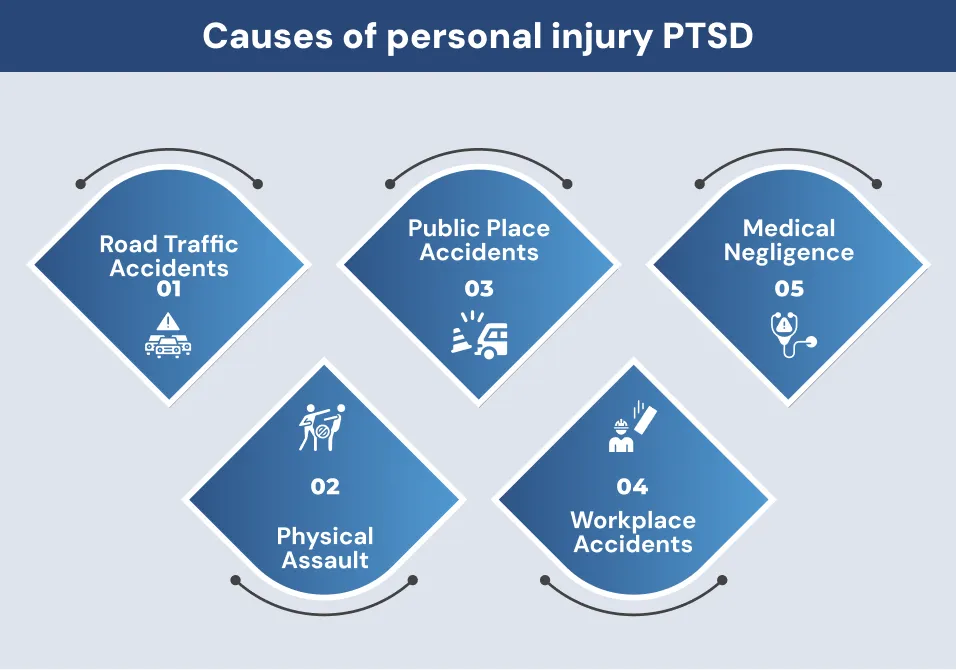
Near-death experience
If you narrowly escape death in an RTA, you can get severe psychological damage.
These events are traumatic for multiple reasons. Mainly, the following ones lead to PTSD:
- Perceived threat to life
- Extreme helplessness
- Witnessing serious injury or death
- Sudden, overwhelming shock
- Persistent fear or horror
- Loss of a loved one
- Re-experiencing the trauma
According to this article “Post-traumatic stress disorder among road traffic accident survivors: A systematic review and meta-analysis”
“PTSD, which is commonly caused by road collisions, often remains unnoticed as a major issue. Without timely and effective intervention, PTSD can lead to enduring negative consequences for RTA survivors, primarily disrupting social relationships and the ability to function in daily life, which can significantly impair their overall quality of life”
Asmitha Bhateja et al.
Therefore, personal injury PTSD compensation can be sought for this.
Read more about Car accident compensation claim.
2. Physical Assault
Another key reason for PTSD from personal injury is physical assault. You may recover from it physically. Yet, the event may leave a negative impact on your mind, leading to PTSD. For instance, the highest rates of lifetime PTSD were recorded to be 38.5% in women who were assaulted. personal injury PTSD compensation ensures that you are compensated for. Physical assault can take place in the following situations:
- Robbery
- Domestic setting
- Random act of violence
In these cases, you can get PTSD due to the following reasons:
- The shock of unexpected violence.
- Loss of safety and trust.
- Ongoing fear, hypervigilance, or paranoia.
- Intense fear, shame, or isolation (especially if the place or assailant were familiar)
Personal injury PTSD compensation takes in to account the severity of your symptoms while compensating you.
3. Public Place Accidents
Accidents in public places are another case for which you can file a claim. The following accidents may occur in public places:
- Slips, trips, falls
- Accidents in the market (e.g, items falling)
- Accidents in parks (e.g, swings malfunctioning)
Victims may avoid public places and live in a constant fear that accidents can recur. This impacts and life and personal injury, PTSD compensation incorporates this factor. The following reasons contribute to PTSD in these cases:
- The incident was sudden and unexpected.
- It caused serious physical injury or embarrassment.
- Bystanders ignored the victim or failed to help.
All these cases, thus, qualify you for personal injury PTSD compensation.
4. Workplace Accidents
You may experience PTSD as a result of several workplace incidents. Depending on your workplace, you can experience various types of these accidents. Some of them are:
- Construction site incidents
- Falls from heights
- Industrial accidents
- Natural disaster injuries
You may be involved in these accidents directly or witness them happening to a coworker. In any case, they can affect your mental health and cause PTSD.
PTSD is not always in combination with physical injuries. It can also develop on its own due to the circumstances surrounding your workplace. For instance:
- Bullying or a toxic work environment
- Exposure to violent or life-threatening situations (e.g., security jobs, emergency services)
- Long-term stress
- Incident of active shooting at the workplace
You can seek personal injury PTSD compensation for any of these issues.
Learn about PTSD treatment.
5. Medical Negligence
Medical errors and traumatic medical experiences can also result in PTSD. Some examples of such cases are:
- Misdiagnosis of a serious illness.
- Surgical mistakes.
- Traumatic childbirth or complications.
- Being awake or aware during surgery (anaesthesia awareness)
If any of these events happen to you, you may lose trust in the healthcare system. You may also develop lasting fears relating to the following:
- Hospitals
- Doctors
- Treatments
Impact of personal injury PTSD
PTSD after a personal injury case can impact most aspects of your life. The worth of personal injury claims is directly impacted by these factors.
Personal life:
PTSD can affect your personal life in numerous ways. It changes your personality and behaviour. You no longer enjoy the things that you do. This impacts your relationships, and they become strained. You find it difficult to keep your friendships. You isolate further and withdraw socially. It also changes your routines and living arrangements. This has an adverse effect on your physical health too, since you may avoid any sport, walk, etc. that you did. These effects should be carefully taken into account for personal injury PTSD compensation.
Professional life:
PTSD symptoms also impact professional life negatively. You can include its effect in personal injury PTSD compensation. The following are some of the ways it can affect:
1. Decreased concentration and memory
Your cognitive functioning may decrease. This will make focusing and concentrating harder.
2. Increased absenteeism
You may feel sick often with symptoms like flashbacks, anxiety or physical symptoms. This may lead you to take frequent sick days or maintain a regular schedule.
3. Lower productivity
Your mental stress can lead to lower work efficiency and output.
4. Impaired relationships with colleagues
You may feel irritable most of the time, which can hinder communication and teamwork.
5. Trouble handling stress
Work pressure can trigger or worsen your PTSD symptoms. This makes following deadlines harder for you.
Risk of job loss or demotion
You should get accommodations to fix your performance issues that PTSD causes. Otherwise, they can lead to disciplinary action or termination.
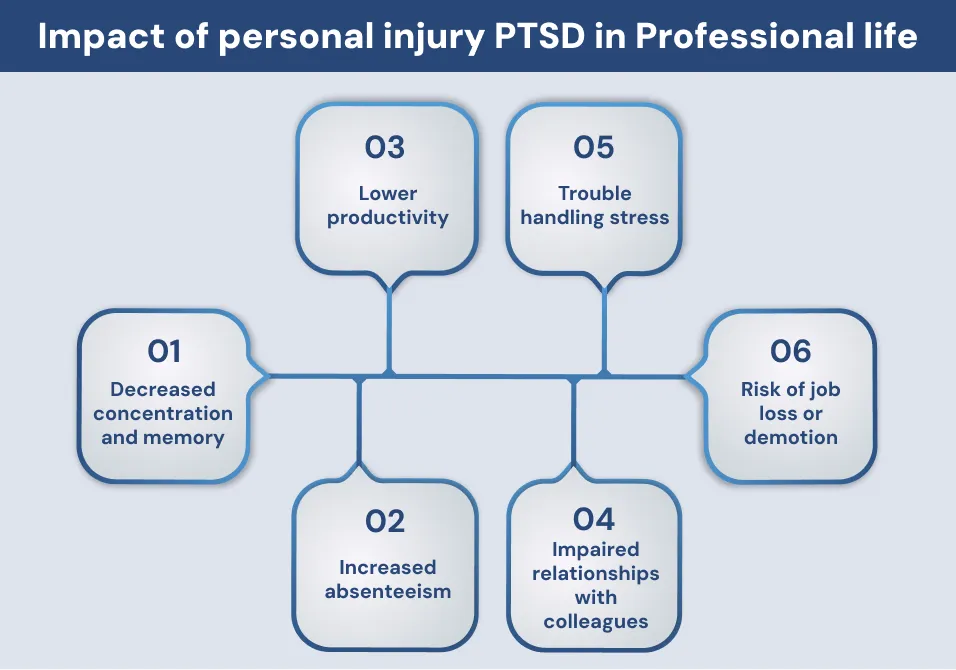
Personal injury claim for PTSD
A personal injury claim for PTSD refers to a legal action for recovering damages. It seeks to compensate you for suffering. In this case, PTSD leaves lasting effects on your life. Hence, you should seek personal injury PTSD compensation for your mental health by filing a claim. To prove that PTSD was caused by the actions of another party, you need evidence.
Is PTSD Covered in Personal Injury Law in the UK?
PTSD is a valid and compensable personal injury in UK personal injury law. You can even file a personal injury PTSD compensation claim when you have PTSD alone, without the physical injury. You just need to prove that the following conditions are fulfilled while filing the claim.
1. Duty of Care
A person or organisation with a duty of care is accountable for your safety and well-being. You must ensure that the liable party owes you this. For example:
- Employers must ensure a safe working environment.
- Drivers must operate vehicles responsibly.
- Property owners must maintain safe premises.
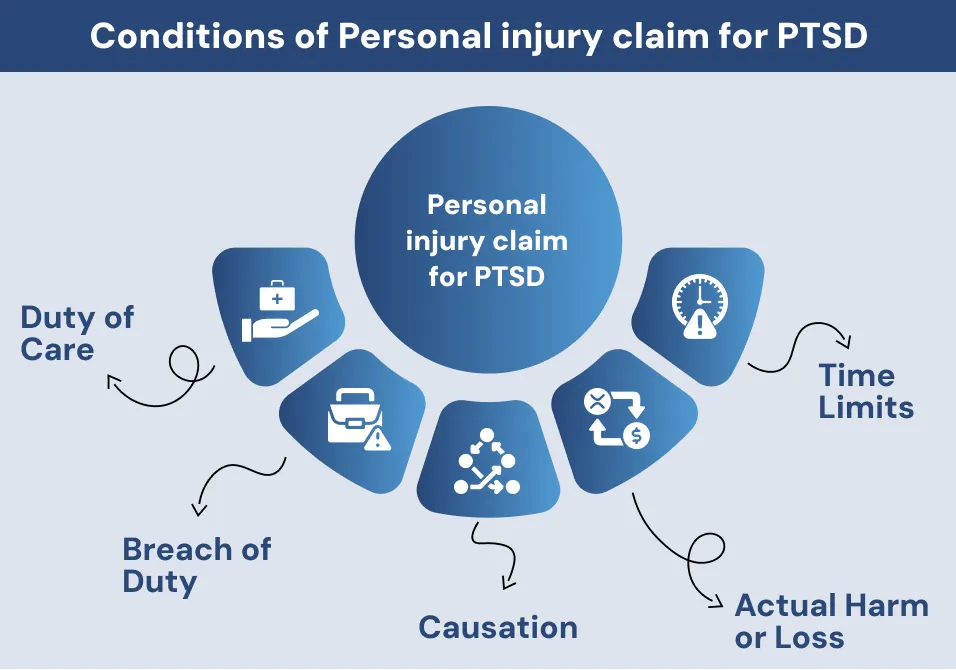
2. Breach of Duty
You must prove that the party you deem responsible breached their duty. They showed negligent, careless or unlawful behaviour. This could involve:
- Unsafe work conditions
- Distracted or reckless driving
- Failure to maintain safety standards
3. Causation
You have to establish the causation in your case. Causation refers to a direct link between breach of duty and your injury. In simple words, your injury wouldn’t have happened if the breach hadn’t occurred.
4. Actual Harm or Loss
You also have to demonstrate an actual harm that can be proven, such as:
- Physical injuries
- Emotional or psychological trauma (e.g., PTSD)
- Financial loss due to medical bills, lost wages, etc.
5. Time Limits (Statute of Limitations)
You must file your personal injury claims within a time limit of 3 years from the date your injury occurred. In case the victim was a minor when the injury happened, their statute of limitations starts as soon as they turn 18. Similarly, a ‘litigation friend’ can file a claim on behalf of people who don’t have the mental capacity.
If these conditions are all fulfilled, you can file a claim for personal injury PTSD compensation.
Learn about the time limit of Injury claims in the UK.
How a PTSD personal injury claim works
Suffering from PTSD from personal injury entitles you a compensation. This personal injury PTSD compensation claim helps you get monetary compensation. You have to follow the right steps to get it.
Here is a step-by-step guide to help you understand the steps better.
1. Get medical help
The first step is to see a doctor or mental health specialist. You need a proper medical exam to confirm if you have PTSD. Obtain your report from the doctor after they have conducted your exam. It will be key evidence in your case. Without it, your claim may not succeed.
2. Talk to a Personal Injury Solicitor
After you have received medical help, look for your legal options. Speak to a personal injury solicitor. These lawyers are experts in helping people who have been harmed because of somebody else’s mistake. Your solicitor will explain to you your rights. They will lead you through the claim process. If you have not gotten your report, they can arrange for expert witnesses. These witnesses can assess your condition and write a report.
3. No-win No-fee agreement
Make a no-win-no-fee agreement. This means if you win the case, only then will you have to pay legal fees. If you lose, you don’t have to pay. This approach will help you to get a personal injury PTSD compensation without any extra burden.
4. Gather evidence
You’ll have to collect as much evidence as you can for your case. Your solicitor will help you, but you should also do it on your own. Here are some examples of useful evidence:
- Medical records showing your PTSD diagnosis
- Reports from a mental health specialist
- Witness statements from people who saw the accident
- Police or accident reports
- Any video or photo proof
- A personal statement about how PTSD has affected your life
Your chances of winning increase when you have enough proof.
5. Understand the amount you can claim
Your personal injury PTSD compensation against the claim covers the following:
General damages
This money covers your emotional and mental pain. It compensates you for your pain, stress, and trauma caused by PTSD.
Special damages
These damages are for your financial losses. They include:
- Medical treatment costs
- Counselling or therapy expenses
- Travel for medical care
- Lost income if you can’t work
Your solicitor will explain to you how much you can get if you claim for both.
Learn more about special and general damages.
6. Know How Much You May Receive
The amount of money you get depends on how serious your PTSD is and how long it lasts. Here are some examples:
Mild PTSD
Its recovery time is 6-12 months. You may receive £4,820 to £9,980.
Moderate PTSD
This means your symptoms are ongoing. You may get £9,980 to £28,250.
Severe PTSD
This type is long-lasting, and it has a severe impact. You could receive £28,250 to £73,050.
These amounts are just a rough estimate. Every case is different, so your solicitor can calculate amounts specific to your conditions.
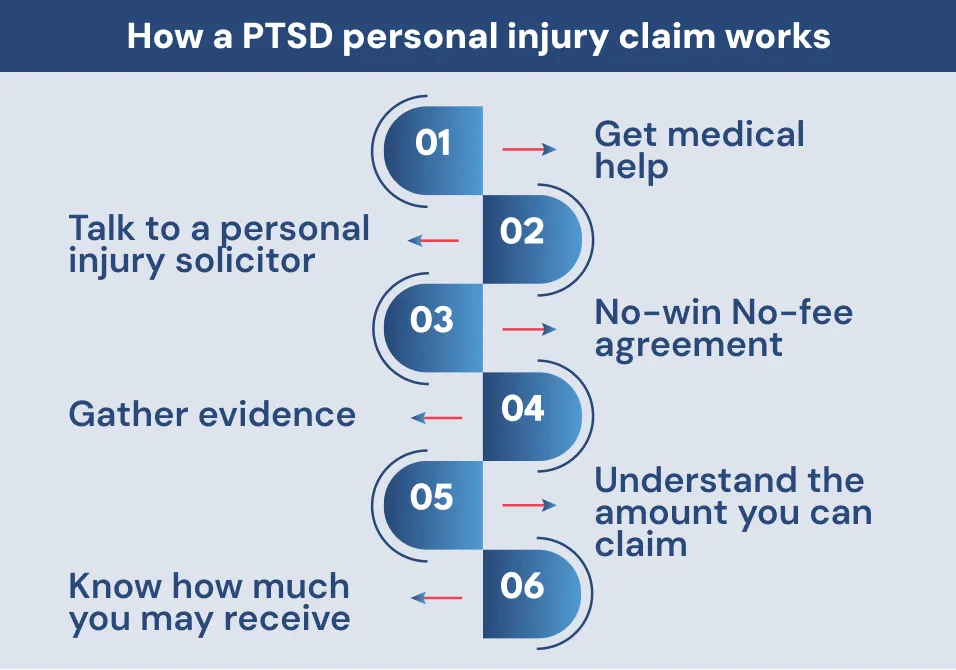
Case study of personal injury PTSD compensation
This case was of a man named Mr. V for privacy purposes. His wife got hit by a car in front of their home. He saw the whole incident. The accident was very severe. His wife suffered a brain injury. She now has to use a wheelchair. She also needs care all the time. The original claim was for compensation for Mr. V’s wife.
However, the accident also had a great effect on him. After watching the terrible accident, he had to take care of his wife around the clock. He soon started suffering from depression and PTSD. He filed his own claim for emotional suffering as well.
Their lawyer asked Mr. P to form a detailed statement on what happened and how it affected him. Mr. P reported that he cried often and kept having flashbacks of the accident. He always felt low and drank too much. He also felt very tired most of the time.
A psychiatrist examined Mr. P. They confirmed that he suffered from PTSD and depression because of the accident and his wife’s condition.
The liable party negotiated the settlement Mr. V got an amount of £45,000 for his emotional distress
Final Thoughts
Getting into PTSD causing incidents can be quite traumatic. Patients often seek personal injury PTSD compensation. This helps them in coping with the emotional damage they have suffered. One can file a compensation claim for PTSD injuries. They’ll receive an adequate amount against their sufferings. At Concise Medico, we help you through this via diagnostic reports. Our reports add value to your claim by giving an accurate extent of your emotional damage.
Get in touch for expert advice on PTSD
FAQs
Physical healing is not always the end of personal injury. Many people also experience emotional distress, which can last considerably longer. Your emotional issues may also lead to Post-Traumatic Stress Disorder (PTSD). This condition is a result of upsetting or stressful events. It can affect multiple aspects of your life, such as sleep, work, relationships, etc.. A personal injury PTSD compensation aims to help you through this situation. It aims to offset the emotional distress you suffered. Here are the details about the personal injury claim for PTSD.
Can you get PTSD from an injury?
PTSD is a common result of injuries. The injuries here imply that you suffered harm because of someone else’s fault. This harm can lead to PTSD.
PTSD occurs when the injury-causing event threatens any harm or violence. As a result, you end up having intense, disturbing thoughts about the event.
You can get a formal diagnosis and file for personal injury PTSD compensation. Here are the symptoms that should prompt your visit to a doctor.
Symptoms of PTSD from personal injury:
Symptoms of PTSD can vary in every person. Here are some of them that you may experience after an incident:
- Avoidance of the site of the accident
- Negative Mood Swings
- Flashbacks of the event
- Dizziness
- Headaches
- Nausea
- Nightmares and other sleep disturbances
- Issues in focusing
- Depression
- Anxiety
- Startle response
Get useful insights about Anxiety disorder.
Causes of personal injury PTSD
PTSD personal injury settlements can be claimed in a lot of cases. All of these cases should fulfil the conditions for a personal injury claim for PTSD. Here are a few examples:
Learn more about personal injury.
1. Road Traffic Accidents (RTAs)
Around the world, RTAs are considered to be a major cause of PTSD. According to studies, 25% of people suffer from PTSD after an RTA. Majorly, the situation becoming unpredictable is what leads you to PTSD. The following are scenarios that commonly lead to PTSD:
High-impact collisions
Victims are traumatised in these accidents because the crashes are often high-speed.
Fatal accidents
If you witness someone’s death or severe injuries in an accident, you are likely to develop PTSD.
Bicycle and pedestrian collisions
If any bicycle user or pedestrian is hit by a vehicle, they can get PTSD since the event is so violent. Personal injury PTSD compensation ensures that you are compensated for this mental anguish.

Near-death experience
If you narrowly escape death in an RTA, you can get severe psychological damage.
These events are traumatic for multiple reasons. Mainly, the following ones lead to PTSD:
- Perceived threat to life
- Extreme helplessness
- Witnessing serious injury or death
- Sudden, overwhelming shock
- Persistent fear or horror
- Loss of a loved one
- Re-experiencing the trauma
According to this article “Post-traumatic stress disorder among road traffic accident survivors: A systematic review and meta-analysis”
“PTSD, which is commonly caused by road collisions, often remains unnoticed as a major issue. Without timely and effective intervention, PTSD can lead to enduring negative consequences for RTA survivors, primarily disrupting social relationships and the ability to function in daily life, which can significantly impair their overall quality of life”
Asmitha Bhateja et al.
Therefore, personal injury PTSD compensation can be sought for this.
Read more about Car accident compensation claim.
2. Physical Assault
Another key reason for PTSD from personal injury is physical assault. You may recover from it physically. Yet, the event may leave a negative impact on your mind, leading to PTSD. For instance, the highest rates of lifetime PTSD were recorded to be 38.5% in women who were assaulted. personal injury PTSD compensation ensures that you are compensated for. Physical assault can take place in the following situations:
- Robbery
- Domestic setting
- Random act of violence
In these cases, you can get PTSD due to the following reasons:
- The shock of unexpected violence.
- Loss of safety and trust.
- Ongoing fear, hypervigilance, or paranoia.
- Intense fear, shame, or isolation (especially if the place or assailant were familiar)
Personal injury PTSD compensation takes in to account the severity of your symptoms while compensating you.
3. Public Place Accidents
Accidents in public places are another case for which you can file a claim. The following accidents may occur in public places:
- Slips, trips, falls
- Accidents in the market (e.g, items falling)
- Accidents in parks (e.g, swings malfunctioning)
Victims may avoid public places and live in a constant fear that accidents can recur. This impacts and life and personal injury, PTSD compensation incorporates this factor. The following reasons contribute to PTSD in these cases:
- The incident was sudden and unexpected.
- It caused serious physical injury or embarrassment.
- Bystanders ignored the victim or failed to help.
All these cases, thus, qualify you for personal injury PTSD compensation.
4. Workplace Accidents
You may experience PTSD as a result of several workplace incidents. Depending on your workplace, you can experience various types of these accidents. Some of them are:
- Construction site incidents
- Falls from heights
- Industrial accidents
- Natural disaster injuries
You may be involved in these accidents directly or witness them happening to a coworker. In any case, they can affect your mental health and cause PTSD.
PTSD is not always in combination with physical injuries. It can also develop on its own due to the circumstances surrounding your workplace. For instance:
- Bullying or a toxic work environment
- Exposure to violent or life-threatening situations (e.g., security jobs, emergency services)
- Long-term stress
- Incident of active shooting at the workplace
You can seek personal injury PTSD compensation for any of these issues.
Learn about PTSD treatment.
5. Medical Negligence
Medical errors and traumatic medical experiences can also result in PTSD. Some examples of such cases are:
- Misdiagnosis of a serious illness.
- Surgical mistakes.
- Traumatic childbirth or complications.
- Being awake or aware during surgery (anaesthesia awareness)
If any of these events happen to you, you may lose trust in the healthcare system. You may also develop lasting fears relating to the following:
- Hospitals
- Doctors
- Treatments
Impact of personal injury PTSD
PTSD after a personal injury case can impact most aspects of your life. The worth of personal injury claims is directly impacted by these factors.
Personal life:
PTSD can affect your personal life in numerous ways. It changes your personality and behaviour. You no longer enjoy the things that you do. This impacts your relationships, and they become strained. You find it difficult to keep your friendships. You isolate further and withdraw socially. It also changes your routines and living arrangements. This has an adverse effect on your physical health too, since you may avoid any sport, walk, etc. that you did. These effects should be carefully taken into account for personal injury PTSD compensation.
Professional life:
PTSD symptoms also impact professional life negatively. You can include its effect in personal injury PTSD compensation. The following are some of the ways it can affect:
1. Decreased concentration and memory
Your cognitive functioning may decrease. This will make focusing and concentrating harder.
2. Increased absenteeism
You may feel sick often with symptoms like flashbacks, anxiety or physical symptoms. This may lead you to take frequent sick days or maintain a regular schedule.
3. Lower productivity
Your mental stress can lead to lower work efficiency and output.
4. Impaired relationships with colleagues
You may feel irritable most of the time, which can hinder communication and teamwork.
5. Trouble handling stress
Work pressure can trigger or worsen your PTSD symptoms. This makes following deadlines harder for you.
Risk of job loss or demotion
You should get accommodations to fix your performance issues that PTSD causes. Otherwise, they can lead to disciplinary action or termination.

Personal injury claim for PTSD
A personal injury claim for PTSD refers to a legal action for recovering damages. It seeks to compensate you for suffering. In this case, PTSD leaves lasting effects on your life. Hence, you should seek personal injury PTSD compensation for your mental health by filing a claim. To prove that PTSD was caused by the actions of another party, you need evidence.
Is PTSD Covered in Personal Injury Law in the UK?
PTSD is a valid and compensable personal injury in UK personal injury law. You can even file a personal injury PTSD compensation claim when you have PTSD alone, without the physical injury. You just need to prove that the following conditions are fulfilled while filing the claim.
1. Duty of Care
A person or organisation with a duty of care is accountable for your safety and well-being. You must ensure that the liable party owes you this. For example:
- Employers must ensure a safe working environment.
- Drivers must operate vehicles responsibly.
- Property owners must maintain safe premises.

2. Breach of Duty
You must prove that the party you deem responsible breached their duty. They showed negligent, careless or unlawful behaviour. This could involve:
- Unsafe work conditions
- Distracted or reckless driving
- Failure to maintain safety standards
3. Causation
You have to establish the causation in your case. Causation refers to a direct link between breach of duty and your injury. In simple words, your injury wouldn’t have happened if the breach hadn’t occurred.
4. Actual Harm or Loss
You also have to demonstrate an actual harm that can be proven, such as:
- Physical injuries
- Emotional or psychological trauma (e.g., PTSD)
- Financial loss due to medical bills, lost wages, etc.
5. Time Limits (Statute of Limitations)
You must file your personal injury claims within a time limit of 3 years from the date your injury occurred. In case the victim was a minor when the injury happened, their statute of limitations starts as soon as they turn 18. Similarly, a ‘litigation friend’ can file a claim on behalf of people who don’t have the mental capacity.
If these conditions are all fulfilled, you can file a claim for personal injury PTSD compensation.
Learn about the time limit of Injury claims in the UK.
How a PTSD personal injury claim works
Suffering from PTSD from personal injury entitles you a compensation. This personal injury PTSD compensation claim helps you get monetary compensation. You have to follow the right steps to get it.
Here is a step-by-step guide to help you understand the steps better.
1. Get medical help
The first step is to see a doctor or mental health specialist. You need a proper medical exam to confirm if you have PTSD. Obtain your report from the doctor after they have conducted your exam. It will be key evidence in your case. Without it, your claim may not succeed.
2. Talk to a Personal Injury Solicitor
After you have received medical help, look for your legal options. Speak to a personal injury solicitor. These lawyers are experts in helping people who have been harmed because of somebody else’s mistake. Your solicitor will explain to you your rights. They will lead you through the claim process. If you have not gotten your report, they can arrange for expert witnesses. These witnesses can assess your condition and write a report.
3. No-win No-fee agreement
Make a no-win-no-fee agreement. This means if you win the case, only then will you have to pay legal fees. If you lose, you don’t have to pay. This approach will help you to get a personal injury PTSD compensation without any extra burden.
4. Gather evidence
You’ll have to collect as much evidence as you can for your case. Your solicitor will help you, but you should also do it on your own. Here are some examples of useful evidence:
- Medical records showing your PTSD diagnosis
- Reports from a mental health specialist
- Witness statements from people who saw the accident
- Police or accident reports
- Any video or photo proof
- A personal statement about how PTSD has affected your life
Your chances of winning increase when you have enough proof.
5. Understand the amount you can claim
Your personal injury PTSD compensation against the claim covers the following:
General damages
This money covers your emotional and mental pain. It compensates you for your pain, stress, and trauma caused by PTSD.
Special damages
These damages are for your financial losses. They include:
- Medical treatment costs
- Counselling or therapy expenses
- Travel for medical care
- Lost income if you can’t work
Your solicitor will explain to you how much you can get if you claim for both.
Learn more about special and general damages.
6. Know How Much You May Receive
The amount of money you get depends on how serious your PTSD is and how long it lasts. Here are some examples:
Mild PTSD
Its recovery time is 6-12 months. You may receive £4,820 to £9,980.
Moderate PTSD
This means your symptoms are ongoing. You may get £9,980 to £28,250.
Severe PTSD
This type is long-lasting, and it has a severe impact. You could receive £28,250 to £73,050.
These amounts are just a rough estimate. Every case is different, so your solicitor can calculate amounts specific to your conditions.

Case study of personal injury PTSD compensation
This case was of a man named Mr. V for privacy purposes. His wife got hit by a car in front of their home. He saw the whole incident. The accident was very severe. His wife suffered a brain injury. She now has to use a wheelchair. She also needs care all the time. The original claim was for compensation for Mr. V’s wife.
However, the accident also had a great effect on him. After watching the terrible accident, he had to take care of his wife around the clock. He soon started suffering from depression and PTSD. He filed his own claim for emotional suffering as well.
Their lawyer asked Mr. P to form a detailed statement on what happened and how it affected him. Mr. P reported that he cried often and kept having flashbacks of the accident. He always felt low and drank too much. He also felt very tired most of the time.
A psychiatrist examined Mr. P. They confirmed that he suffered from PTSD and depression because of the accident and his wife’s condition.
The liable party negotiated the settlement Mr. V got an amount of £45,000 for his emotional distress
Final Thoughts
Getting into PTSD causing incidents can be quite traumatic. Patients often seek personal injury PTSD compensation. This helps them in coping with the emotional damage they have suffered. One can file a compensation claim for PTSD injuries. They’ll receive an adequate amount against their sufferings. At Concise Medico, we help you through this via diagnostic reports. Our reports add value to your claim by giving an accurate extent of your emotional damage.
Get in touch for expert advice on PTSD
